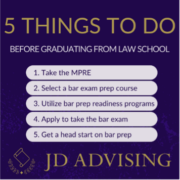What To Expect on The California Performance Test
What To Expect on The California Performance Test
If you are taking the California Bar Exam, you may wonder what to expect on the performance test portion of the exam. In this post, we break down tasks that have been assigned on some recent administrations of the California Performance Test and also cover some important takeaways!
What To Expect on The California Performance Test
What Tasks Have Been Assigned on California Performance Tests?
Effective beginning July 2017, California changed the format of its bar exam. Prior to July 2017, the California Bar Exam contained two three-hour performance tests. Starting with the July 2017 administration, the California Bar Exam now contains one ninety-minute performance test. For this reason, it is important that you use the more recent performance tests as you are practicing because they are designed to be completed in the 90-minute time frame that you will be given for the performance test on the exam. If you are looking for additional practice performance tests, we recommend that you look at the Multistate Performance Tests (MPTs) from previous administrations. Although California writes its own performance test and does not administer the MPT, the MPTs are similarly designed to be completed in ninety minutes and are therefore great practice material as you prepare for the California Bar Exam.
Since the change was implemented, the California performance test has twice assigned an objective memo, twice assigned a persuasive brief, and once assigned a persuasive letter. We provide more detailed information on the scenarios presented in the recent California performance tests below.
In three of the four performance tests, the instructions in the task memo specifically state NOT to draft a statement of facts. For the fourth PT in which the task memo is silent regarding a statement of facts, both Sample Answers provided by the State Bar of California contain a short statement of facts. So, unless the task memo specifically tells you not to draft a statement of the facts, you should include one in your performance test response.
Another important takeaway is that California provides a lot of structure and guidance regarding the substantive arguments that examinees should address. Three of the four task memos from the administrations utilizing a ninety-minute PT laid out the specific arguments that examinees needed to address. This is important because it means that fewer points will be awarded for organization and more points will be awarded from strong analysis and factual support.
Finally, it is important to note that the File often appears quite short for the California performance tests. Many of the Files contain a single document. A lot of factual information is contained in the Task Memo and it is crucial for examinees to draw upon all factual information provided. It is also often important to identify which facts, if available, would be helpful in analyzing the issues and/or reaching conclusions had they been known. With limited facts available, it can be easy for examinees to write very short responses. Avoid this mistake by being as thorough as possible!
Here are more specific details regarding each of the previous five California performance tests:
July 2019
This Performance Test assigned examinees to write an objective memorandum. The actual performance test has not yet been released by the State Bar of California and additional information is not yet available.
February 2019: People v. Raymond
This Performance Test assigned examinees to write a persuasive brief. The task memo does not contain any instructions regarding whether or not to write a statement of facts.
This task is assigned by the Deputy District Attorney and asks examinees to place themselves in the shoes of an assistant prosecuting attorney and argue that a $45,000 bond should be forfeited due to the defendant’s failure to appear for trial. The task memo does not provide much guidance as to which substantive arguments should be made in the brief.
A hearing on the issues already took place and the File contains a transcript of said hearing. The library consists of three cases from the hypothetical state of Columbia: two from the Court of Appeals and one from the Supreme Court. Although not separately provided as an item within the library, many of the issues in this performance test involve statutory interpretation of Columbia Rule of Criminal Procedure 13 regarding forfeiture of bonds. This rule is cited within one of the cases in the library and interpreted in a second case. The third case contains additional factors to consider that are unrelated to the Rule of Criminal Procedure. Reading the cases in chronological order would be beneficial in seeing the progression and statutory interpretation issues in this performance test.
July 2018: In the Matter of Abigail Watkins
This Performance Test assigned examinees to write a persuasive brief. The task memo specifically instructs applicants not to write a statement of facts.
This task asks examinees to suppose that they are attorneys at a firm that has been hired to represent Abigail Watkins in a disciplinary proceeding brought by the State Bar of Columbia. Ms. Watkins was charged by the U.S. Attorneys’ office and found guilty of insider trading. The State Bar of Columbia then instituted disciplinary proceedings against Ms. Watkins as a result of her felony conviction. The task memo identifies the key legal issue as “whether the facts and circumstances surrounding the insider trading by Watkins involved moral turpitude.” The task memo further outlines two specific arguments that examinees are expected to raise in their briefs in support of Ms. Watkins’ position that the conviction does not involve moral turpitude.
The file contains the plea agreement, a one-page statement of facts supporting the plea agreement, and a five-page transcript from the hearing at which Ms. Watkins took the plea and put the facts supporting the plea on the record. The library consists of one case from the Columbia Supreme Court and one appellate opinion from the State Bar Court reviewing a disciplinary matter. The case provided in the library directly correlates to the first argument presented in the task memo while the disciplinary proceeding opinion correlates to the second issue. Given the large amount of information provided to examinees regarding the arguments and structure of their persuasive briefs, in-depth analysis and factual support is very important to success on this performance test.
February 2018: Meaney v. Trustees of the University of Columbia
This Performance Test assigned examinees to write an objective memorandum. The task memo specifically instructs applicants not to write a statement of facts.
The task is assigned by an attorney at a firm that has been retained by the University of Columbia to defend the University in a breach of contract action. Pursuant to the facts, the University Trustees received a garden from a donor and the school would now like to sell the garden and use the proceeds for educational purposes. The donor passed away, and this action was brought by the donor’s late wife’s child from a previous marriage, who is trying to prevent the school from selling the garden. The assigning attorney would like to argue that the case should be dismissed because the child lacks standing. The memo identifies that the underlying question for the standing issue is whether the garden was transferred by way of contract or gift. Furthermore, examinees are instructed that, if the garden was transferred by gift, to identify what type of gift it was.
The file in this performance test is exceptionally short and contains only a one-page agreement purporting to convey the garden to the University. The Library contains three court cases: two from the Court of Appeals and one from the Supreme Court. Each case seems to correlate with one of the three issues (contract or gift; conditional/unconditional gift, and charitable trust).
July 2017: United States v. Blake C. Davis
This Performance Test assigned examinees to write a persuasive letter. The task memo specifically instructs applicants not to write a statement of facts.
In the task memo, examinees are told that their firm represents a man who is potentially going to be charged with two felonies. The assigning attorney believes that the prosecuting attorney can be convinced to offer a plea deal to a misdemeanor instead of bringing felony charges. Applicants are tasked with convincing the prosecuting attorney to accept such a plea. The task memo lays out one argument that examinees are to address regarding an unreasonable search and seizure that violated the Fourth Amendment.
Surprisingly, the File for this PT contains quite a bit of information, including a four-page transcript of an interview between the assigning attorney and the client and a three-page incident report. The Library contains only one case, but it is fairly lengthy at just over five pages.
Looking to Pass the California Bar Exam?
📚 Ready to Conquer the California Bar Exam?
- Free Bar Exam Resource Center: Your gateway to handpicked guides, webinars, and articles.
- Expert-Written Bar Exam Guides: Get a CA bar exam essay guide, strategies for passing, and advice on choosing the ideal tutor.
Top Resources Recommended by our Students:
- Bar Exam Outlines: Our comprehensive and condensed bar exam outlines present key information in an organized, easy-to-digest layout.
- California One-Sheets and Baby Bar One-Sheets: Consistently 5-star rated by our students.
- California Essay Exam Mastery Class: Target the most tested and challenging California bar segments.
- California and Baby Bar Exam Private Tutoring: Get personalized tutoring by bar exam experts.
- On Demand Bar Exam Course: 5-star rated for your comprehensive preparation. Free course preview available!
- Real MBE Questions: Perfect your practice with the best of practice materials.
🔥 NEW! Check out our Repeat Taker Bar Exam Course and our unrivaled platinum Guarantee Pass Program!






Leave a Reply
Want to join the discussion?Feel free to contribute!